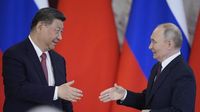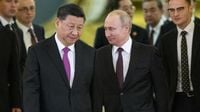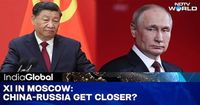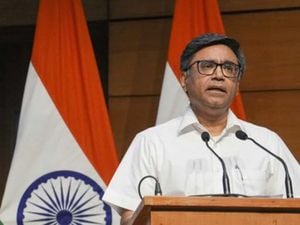In a significant display of unity, Chinese President Xi Jinping and Russian President Vladimir Putin have reaffirmed their alliance, pledging to resist what they describe as the "unilateralism and hegemonic bullying" propagated by the United States and its Western allies. Xi's four-day visit to Moscow this week coincided with the commemoration of the defeat of Nazi Germany in World War II, an event both leaders used to emphasize their shared historical narratives and contemporary global concerns.
During his visit, Xi conveyed that China would stand firmly with Russia against international pressures that seek to undermine the sovereignty and dignity of nations outside Western influence. He declared, "In the face of the international counter-current of unilateralism and hegemonic bullying behaviour, China will work with Russia to shoulder the special responsibilities of major world powers." This statement highlights the growing discontent among nations regarding Western interference in their domestic affairs.
Putin expressed his appreciation for the strengthening of ties with China, underscoring the mutual respect both nations share for their history and the global order they hope to uphold. In the context of the ongoing conflict in Ukraine, Putin has often portrayed Russia's actions as a fight against modern-day Nazism, positioning himself in direct opposition to what he perceives as Western hegemonic ambitions.
The visit has drawn significant attention amid an increasingly tense geopolitical landscape, with the U.S. applying diplomatic pressure on both Russia and Ukraine to reach a peace agreement. Concerns are rising in Moscow and Beijing about a growing power imbalance in international relations, particularly due to U.S. backing of Ukraine in the conflict.
As Xi and Putin engaged in discussions, they emphasized the importance of countering Western dominance. Xi stated that China and Russia should "safeguard international fairness and justice" while working to "eliminate external interference." Putin described their relationship as a "fully fledged partnership and strategic interests," indicating a commitment to deepening their cooperation.
On May 8, Xi declared that their nations should be "true friends of steel that have been through a hundred trials by fire," further solidifying the bond between the two countries. The timing of Xi's visit is particularly significant, marking the 80th anniversary of the Soviet victory over Nazi Germany. This anniversary serves as a reminder of the sacrifices made during the war and the historical ties that bind Russia and China.
As part of the celebrations, Xi is set to attend the Victory Day parade on May 9, where Chinese troops will march alongside Russian soldiers on Red Square. The event will feature armies from 13 countries, showcasing a united front against perceived Western aggression. Despite the celebratory atmosphere, the backdrop of the Ukraine war looms large, with tensions remaining high.
Putin announced a 72-hour ceasefire starting May 8, coinciding with the Victory Day celebrations. However, Ukraine's President Volodymyr Zelensky has called for a longer 30-day truce, dismissing Putin's ceasefire as a manipulation of the peace process. Ukrainian officials reported numerous ceasefire violations, claiming that Russia continued to launch attacks during the supposed truce.
In a joint statement issued after their talks, Xi and Putin rejected what they described as Washington's attempts to contain them, vowing to "increase interaction and strengthen cooperation" to counter U.S. efforts. The leaders also criticized U.S. President Donald Trump's plans for a space-based missile defense shield, labeling it "deeply destabilizing." This joint rebuke underscores the growing rift between the U.S. and the two nations.
Throughout Xi's visit, discussions focused on various issues, including energy cooperation and the proposed Power of Siberia 2 gas pipeline, which aims to transport natural gas from western Russia to northern China. This project is seen as a crucial step in deepening energy ties between the two countries, especially in light of Western sanctions imposed on Russia over the Ukraine war.
As the geopolitical landscape evolves, the partnership between China and Russia continues to challenge U.S. influence on multiple fronts. The two nations are positioning themselves as alternative world powers, advocating for a more balanced and multipolar world order where no single country can dictate terms to others. This growing alliance represents a significant shift in global dynamics, with both countries determined to resist Western-led pressures that undermine their sovereignty.
As Xi and Putin stand united, their message is clear: the world is shifting, and the U.S. no longer holds the uncontested reins of global power. The implications of this partnership will likely reverberate across international relations, as nations increasingly seek to assert their independence in the face of perceived hegemonic threats.
In conclusion, Xi's visit to Russia highlights not only the deepening ties between the two nations but also their shared commitment to countering Western influence. As they celebrate their historical victories, both leaders are keenly aware of the challenges ahead and are prepared to navigate the complexities of a rapidly changing world.






